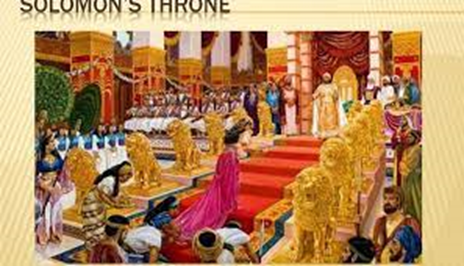
1 Kings 10:1 – 29 “Now when the queen of Sheba heard about the fame of Solomon concerning the name of the LORD, she came to test him with difficult questions. She arrived in Jerusalem with a very large caravan—with camels bearing spices, gold in great abundance, and precious stones.
So, she came to Solomon and spoke to him all that was on her mind. And Solomon answered all her questions; nothing was too difficult for the king to explain. When the queen of Sheba saw all the wisdom of Solomon, the palace he had built, the food at his table, the seating of his servants, the service and attire of his attendants and cupbearers, and the burnt offerings he presented at the house of the LORD, it took her breath away. She said to the king, “The report I heard in my own country about your words and wisdom is true. But I did not believe these things until I came and saw with my own eyes. Indeed, not even half was told to me. Your wisdom and prosperity have far exceeded the report I heard. How blessed are your men! (Some versions read “How blessed are your wives.”) How blessed are these servants of yours who stand continually before you and hear your wisdom! Blessed be the LORD your God, who has delighted in you to set you on the throne of Israel. Because of the LORD’s eternal love for Israel, He has made you king to carry out justice and righteousness.”
Then she gave the king 120 talents of gold, (120 talents is approximately 4.52 tons or 4.1 metric tons of gold.) a great quantity of spices, and precious stones. Never again was such an abundance of spices brought in as those the queen of Sheba gave to King Solomon.
(The fleet of Hiram that brought gold from Ophir also brought from Ophir a great cargo of almug c wood and precious stones. The king made the almug wood into steps for the house of the LORD and for the king’s palace, and into lyres and harps for the singers. Never before had such almug wood been brought in, nor has such been seen to this day.)
King Solomon gave the queen of Sheba all she desired—whatever she asked—besides what he had given her out of his royal bounty. Then she left and returned to her own country, along with her servants.
The weight of gold that came to Solomon each year was 666 talents, (666 talents is approximately 25.1 tons or 22.8 metric tons of gold not including the revenue from the merchants, traders, and all the Arabian kings and governors of the land.
King Solomon made two hundred large shields of hammered gold; six hundred shekels of gold went into each shield. (600 shekels is approximately 15.1 pounds or 6.8 kilograms of gold.) He also made three hundred small shields of hammered gold; three minas of gold went into each shield. And the king put them in the House of the Forest of Lebanon. (3 minas is approximately 3.77 pound3s or 1.71 kilograms of gold; possibly a reference to double minas, that is, approximately 7.54 pounds or 3.42 kilograms.)
Additionally, the king made a great throne of ivory and overlaid it with pure gold. The throne had six steps, and its back had a rounded top. There were armrests on both sides of the seat, with a lion standing beside each armrest. Twelve lions stood on the six steps, one at either end of each step. Nothing like this had ever been made for any kingdom.
All King Solomon’s drinking cups were gold, and all the utensils of the House of the Forest of Lebanon were pure gold. There was no silver, because it was accounted as nothing in the days of Solomon. For the king had the ships of Tarshish at sea with Hiram’s fleet, and once every three years the ships of Tarshish would arrive bearing gold, silver, ivory, apes, and peacocks.
So, King Solomon surpassed all the kings of the earth in riches and wisdom. The whole world sought an audience with Solomon to hear the wisdom that God had put in his heart. Year after year, each visitor would bring his tribute: articles of silver and gold, clothing, weapons, spices, horses, and mules. Solomon accumulated 1,400 chariots and 12,000 horses, which he stationed in the chariot cities and also with him in Jerusalem. The king made silver as common in Jerusalem as stones, and cedar as abundant as sycamore in the foothills.
Solomon’s horses were imported from Egypt and Kue; (Probably an area in Cilicia, a province in the southeast of Asia Minor) the royal merchants purchased them from Kue. A chariot could be imported from Egypt for six hundred shekels of silver, and a horse for a hundred and fifty. Likewise, they exported them to all the kings of the Hittites and to the kings of Aram. (600 shekels is approximately 15.1 pounds or 6.8 kilograms of silver. 150 shekels is approximately 3.8 pounds or 1.7 kilograms of silver.)”
The amount of wealth pouring into Solomon’s kingdom is truly astounding! Little wonder that the Queen of Sheba was amazed when she visited. Reading the accounts of the amount of gold, silver, jewels, precious metals, precious wood, and other treasures that poured into Solomon’s kingdom every year is mind boggling! But Solomon missed an incredible opportunity. “So, King Solomon surpassed all the kings of the earth in riches and wisdom. The whole world sought an audience with Solomon to hear the wisdom that God had put in his heart.”
Solomon was sharing his wisdom and collecting tribute from his visitors, but he was NOT giving glory to God or telling these people about the One True God of Israel. Solomon had an incredible opportunity to share the truths of God with people coming from idolatrous nations, and he blew it!
The root of Solomon’s problem was disobedience. Deuteronomy 17 ordained that any king of Israel should write out his own copy of the Laws of Moses so that he could study them for himself. It has been shown that students learn far more when they write things out by hand than when they type on computers or copy and paste and download from the internet. There is no evidence that Solomon ever truly studied the Laws of Moses at all, and he certainly never wrote out his own copy. Anyone as wise as Solomon was certainly literate and could have copied the law had he wished. Solomon never asked himself why God would give him all this wealth and wisdom; he simply took it for granted as his due. Solomon suffered from entitlement syndrome.
APPLICATION: These days, there are a number of believers who make the same mistake that Solomon made. Rather than engaging in Bible study and in practices that foster self – discipline, these people hope to become instant saints. Self – indulgence has become a goal for many believers. Having chosen to follow Jesus, there are many who feel that now everything should go smoothly, and that they should be able to do what they want, without changing at all. But spiritual growth demands self – discipline and sacrifice. 2 Peter 1:5 – 9 tells us, “For this very reason, make every effort to add to your faith virtue; and to virtue, knowledge; and to knowledge, self-control; and to self-control, perseverance; and to perseverance, godliness; and to godliness, brotherly kindness; and to brotherly kindness, love. For if you possess these qualities and continue to grow in them, they will keep you from being ineffective and unproductive in your knowledge of our Lord Jesus Christ. But whoever lacks these traits is nearsighted to the point of blindness, having forgotten that he has been cleansed from his past sins.”
Originally, Solomon humbled himself before the Lord; however, he rapidly turned away, becoming entranced with the trappings of wealth. Later on, in the Book of Ecclesiastes 2:1 – 11, Solomon expressed his disappointment with his choice of lifestyle.
“I said to myself, “Come now, I will test you with pleasure; enjoy what is good!” But it proved to be futile.
I said of laughter, “It is folly,” and of pleasure, “What does it accomplish?” I sought to cheer my body with wine and to embrace folly—my mind still guiding me with wisdom—until I could see what was worthwhile for men to do under heaven during the few days of their lives.
I expanded my pursuits. I built houses and planted vineyards for myself. I made gardens and parks for myself, where I planted all kinds of fruit trees. I built reservoirs to water my groves of flourishing trees. I acquired menservants and maidservants, and servants were born in my house. I also owned more herds and flocks than anyone in Jerusalem before me, and I accumulated for myself silver and gold and the treasure of kings and provinces. I gathered to myself male and female singers, and the delights of the sons of men—many concubines. So, I became great and surpassed all in Jerusalem who had preceded me; and my wisdom remained with me. Anything my eyes desired, I did not deny myself. I refused my heart no pleasure. For my heart took delight in all my work, and this was the reward for all my labor. Yet when I considered all the works that my hands had accomplished and what I had toiled to achieve, I found everything to be futile, a pursuit of the wind; there was nothing to be gained under the sun.”
Solomon had it all and realized it was meaningless. A life that does not glorify God will ultimately result in disappointment and dissatisfaction. May God help us to realize that He does not give us gifts to spend only on ourselves, but for us to bless those around us and to point them to Him!
PRAYER: Father God, thank You for loving us and for caring for us. Lord, help us to receive Your gifts as stewards, realizing that You want us to bless others and to demonstrate Your love to them. In the mighty and precious Name of King Jesus. Amen.

Leave a comment